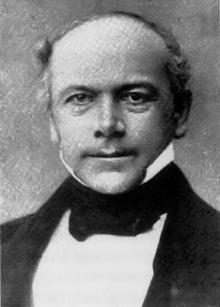Johann Christian Konrad von Hofmann

Johann Christian Konrad von Hofmann (December 21, 1810 – December 20, 1877) was a Lutheran theologian and historian.
He was born at Nuremberg, and studied theology and history at the University of Erlangen. In 1829 he went to Berlin, where Schleiermacher, Hegel, Hengstenberg, Neander, Ranke and Raumer were among his teachers. He was particularly influenced by Ranke, who almost persuaded him to focus entirely upon secular history rather than Christian theology.
In 1833 Hofmann received an appointment to teach Hebrew and history in the gymnasium of Erlangen. In 1835 he became Repetent, in 1838 Privatdozent and in 1841 professor extraordinarius in the theological faculty at Erlangen. In 1842 he became professor ordinarius at the University of Rostock, but in 1845 returned once more to Erlangen as the successor of Gottlieb Christoph Adolf von Harless, founder of the Zeitschrift für Protestantismus und Kirche, of which Hofmann became one of the editors in 1846, J. F. Höfling (1802–1853) and Gottfried Thomasius (1802–1875) being his collaborators. He died in Erlangen. He was a conservative in theology, but an enthusiastic adherent of the progressive party in politics, and sat as member for Erlangen and Fürth in the Bavarian second chamber from 1863 to 1868.
Hofmann's Trinitarian view of God is grounded in the divine love, which is the cause of God's free decision to self-differentiate God’s self in history and give God’s self (divine kenosis or “divine self-emptying”) in history in order to realize in the human Jesus a new humanity. The focal point of Hofmann's conception of “salvation history” (Heilsgeschichte) is his understanding of Trinitarian kenosis, that the eternal God has become historical by “emptying” God’s self into Jesus in order to reconcile the whole world to God. According to Hofmann, world history can only be understood properly within the historical self-giving of the triune God who is love. Salvation history, therefore, is not separate from history but ultimately embraces and fulfills all history within itself. Thus salvation history (Heilsgeschichte) is not a part of world-history, but rather world-history is a part of salvation history.
Hofmann's Trinitarian theology of history is properly eschatological: History is given its unity and meaning by viewing it from its end—not from its beginning—though its end appears in the midst of history and is discernible only in faith. Hofmann believed, in light of his baptismal regeneration and by faith, that God has already revealed the end or goal of history (its unity) in the event of Jesus, who is "the center of all history." In Jesus the eternal God has become temporal to give the eternal Self in love in order to restore and unite the temporal to God.
Hofmann's historical perspective was tempered by his concern to take seriously the inescapable pre-understanding that every interpreter of the Bible brings to the biblical text and to reckon with the hermeneutical implications that a particular religious perspective creates for biblical interpretation. Hofmann acknowledged that the interpreter’s personal participation in his knowledge and understanding, in both its discovery and its validation, is an indispensable part of interpretation itself. His hermeneutical reflections thus form an important development between the hermeneutics of Schleiermacher and later thinkers such as Martin Heidegger, Hans-Georg Gadamer, Rudolf Bultmann, and Paul Ricoeur, who have also analyzed the historicity of language and the historicality of the biblical interpreter.
Works
- Die siebzig Jahre des Jeremias u. die siebzig Jahrwochen des Daniel (1836)
- Geschichte des Aufruhrs in den Cevennen (1837)
- Lehrbuch der Weltgeschichte fur Gymnasien (1839), which became a text-book in the Protestant gymnasia of Bavaria
- Weissagung u. Erfullung im allen u. neuen Testamente (1841–1844; 2nd ed., 1857–1860)
- Der Schriftbeweis (1852–1856; 2nd ed., 1857 1860)
- Die heilige Schrift des neuen Testaments zusanimenhangend untersucht (1862–1875)
- Schutzschriften (1856–1859), in which he defends himself against the charge of denying the Atonement
- Theologische Ethik (1878)
His most important works are the five last named. In theology, as in ecclesiastical polity, Hofmann was a conservative, confessional Lutheran, although the strongly marked individuality of some of his opinions laid him open to repeated accusations of heterodoxy. He was the head of what has been called the Erlangen School, and in his day he was unquestionably a principal figure at the University of Erlangen.
Further reading
- articles in Herzog-Hauck's Realencyklopädie and the Allgemeine deutsche Biographie
- F. Lichtenberger, History of German Theology in the Nineteenth Century (1889) pp. 446–458.
- Becker, Matthew L. (2004). The Self-giving God and Salvation History: The Trinitarian Theology of Johannes von Hofmann (paperback). T & T Clark. ISBN 0-567-02720-1.
Notes
References
 This article incorporates text from a publication now in the public domain: Chisholm, Hugh, ed. (1911). "Hofmann, Johann Christian Konrad von". Encyclopædia Britannica (11th ed.). Cambridge University Press.
This article incorporates text from a publication now in the public domain: Chisholm, Hugh, ed. (1911). "Hofmann, Johann Christian Konrad von". Encyclopædia Britannica (11th ed.). Cambridge University Press.